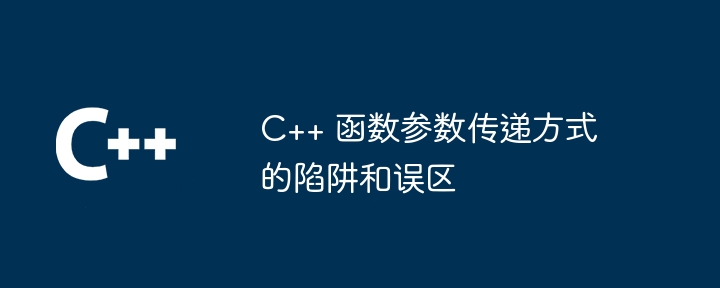
C There are two ways to pass function parameters: passing by value and passing by reference. Passing by value creates a copy of the parameter, and modifications to the copy do not affect the original variable. The parameter address is passed by reference, and modifying the reference object directly affects the original variable. Common pitfalls include: incorrectly passing reference parameters resulting in pass-by-value, modifying a pass-by-value parameter without affecting the original variable, uninitialized references, and dangling references. When handling strings, passing strings by reference can avoid losing modifications caused by passing by value.

When passing function parameters in C, there are two main ways: passing by value and passing by reference transfer. It’s crucial to understand the nuances of both approaches to avoid common pitfalls and pitfalls.
Pass by value creates a copy of the parameter and passes the copy to the function. Any modifications to the copy in the function are not visible.
void print_double(int x) {
x *= 2;
std::cout << x << std::endl;
}
int main() {
int a = 5;
print_double(a); // 输出:10
std::cout << a << std::endl; // 输出:5
}Pass by reference passes the address of the parameter to the function. Any modification to the object referenced in the function directly affects the original object.
void swap(int& a, int& b) {
int temp = a;
a = b;
b = temp;
}
int main() {
int x = 5, y = 10;
swap(x, y);
std::cout << x << " " << y << std::endl; // 输出:10 5
}Trap 1: Improperly Passing Reference Parameters
Passing a normal variable instead of a reference variable will result in pass-by-value, Even if function parameters are declared as references.
Trap 2: Trying to modify a parameter passed by value
Modifications to a parameter passed by value will not be reflected in the original variable.
Trap 3: Reference to an uninitialized variable
Before passing a reference parameter, make sure the variable is initialized.
Trap 4: Dangling Reference
When the referenced object no longer exists, the reference points to invalid memory. Avoid having references to temporary or out-of-scope objects.
Practical case: String processing
Consider a function that gets the first character of a string:
char get_first_char(std::string str) {
return str[0];
}Use pass by value, when Any modifications made will be lost when the function returns. To solve this problem, we should pass the string by reference:
char get_first_char(std::string& str) {
return str[0];
}This ensures that any modifications to the string are reflected outside the function.
The above is the detailed content of Traps and misunderstandings in C++ function parameter passing methods. For more information, please follow other related articles on the PHP Chinese website!
 What are the differences between c++ and c language
What are the differences between c++ and c language
 Recommended learning order for c++ and python
Recommended learning order for c++ and python
 Cost-effectiveness analysis of learning python and c++
Cost-effectiveness analysis of learning python and c++
 Is c language the same as c++?
Is c language the same as c++?
 Which is better to learn first, c language or c++?
Which is better to learn first, c language or c++?
 The difference and connection between c language and c++
The difference and connection between c language and c++
 C++ software Chinese change tutorial
C++ software Chinese change tutorial
 Cost-effectiveness analysis of learning python, java and c++
Cost-effectiveness analysis of learning python, java and c++




